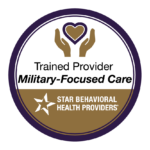Acceptance & Commitment Therapy (ACT)
The goal of ACT Therapy is psychological flexibility – a fancy term for experiencing the present moments
without distraction and defense – helping you embrace and overcome life’s challenges.
Sounds too good to be true, but it can be a reality!
What is Acceptance & Commitment Therapy?
Acceptance and commitment (ACT) therapy focuses on helping a client face their feelings and work through them. This allows you to embrace your thoughts and feelings rather than struggle with them or feel guilty about them. Russ Harris says it best, “The goal of ACT is to create a rich and meaningful life, while accepting the pain that inevitably goes with it.” ACT< is about taking goal-oriented action, informed by your values so you can live the life YOU design.
But what is ACT? ACT is a modern behavioral psychology. ACT uses interventions that apply mindfulness and acceptance processes, helps you gain contact with the present moment, focuses on your development of commitment, creates behavior change processes, and ultimately gives you psychological flexibility. We’ll explain why you need this below.
Acceptance & Commitment Therapy Treatment Methods
There are Six Principles of Acceptance and Commitment Therapy
- Cognitive Diffusion- We are not our thoughts.
- Acceptance- I can be with difficult thoughts without struggling with them. Accepting means not suffering; it doesn’t mean being walked on or giving up.
- Contact/Connection with the Present Moment- The present moment is the only time we can take action or be happy. This is where skills are developed to help you be here, now.
- The Observing Self- Development of the part of ourselves that is consistent– this gives us space to see how our thinking and feeling self is transient.
- Values Clarification- This helps you identify what is most important to you, your deepest desires, and helps build a guide to live by.
- Committed Action- This is your change maker. This is where you set your goals, guided by values, and where you develop tools to address difficult thoughts and feelings which might get in the way of your committed action. (Hayes, “The Six Core Processes of ACT”)
These principles are a guide to ACT Therapy and while they are listed in order above, it is not a step-by-step process but a flexible process. These principles complement and build off each other but also exist independently.
The goal of ACT is psychological flexibility. The truth is, this is actually a goal most people have in life without the fancy science term. Psychological flexibility is the ability to “make contact with experiences in the present moment fully and without defense” (Steven Hayes). If I could just get out of my head and be present without my own worry, judgement or distraction, life would sure feel better.
Being psychologically flexible allows you to stay the course when distracting thoughts, feelings, and physical sensations arise. Being psychologically flexible helps you take a more holistic view of your present moment or situation instead of your actions or decisions changing with your feelings and thoughts. This means you choose how you respond according to your values and goals for your life.
How Can Acceptance & Commitment Therapy Help Me?
ACT is a life-affirming perspective; it helps you practice self-acceptance and self-determination. In this innovative counseling approach, you face your fears openly and commit to actions that help you meet your goals. With this counseling approach you will learn to embrace challenges and overcome them.
ACT can effectively treat numerous conditions, including depression, obsessive-compulsive disorder, anxiety disorders, psychosis, chronic pain, and life transitions.
At MUV Counseling, we help our clients take a step forward and toward a better life. In acceptance and commitment therapy, you choose to face your fears to overcome them. Contact us at 480.300.2635.
You don’t have to face life without these helpful tools!

If you’d like to learn more about ACT, call us at 480-300-2635 for a free 15 minute consultation or email us with your questions. If you’re ready to get started, schedule online here.



